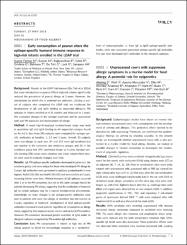Clinical features and prognostic factors in children with food protein induced allergic proctocolitis: A multicenter study

View/
Access
info:eu-repo/semantics/openAccessDate
2018Author
Büyüktiryaki, BetülÇelik, İlknur Külhaş
Erdem, Semiha Bahçeci
Çapanoğlu, Murat
Civelek, Ersoy
Güç, Belgin Usta
Güvenir, Hakan
Çakır, Murat
Can, Demet
Metadata
Show full item recordAbstract
Background:The frequency of food protein‐induced allergic proc-tocolitis (FPIAP) has increased in the last decade, however there islimited information regarding the features, risk factors and prognosisof the disease.Method:The study was conducted in five different allergy outpa-tient clinics and included children less than one year of age whowere admitted with rectal bleeding and had a diagnosis of FPIAPand also who were under follow‐up with FPIAP during the studyperiod between September 2016 and August 2017. All patients wereevaluated for clinical features, prognosis and prognostic factors.Results:Overall, 257 infants were evaluated and 50.2% (n = 129)were female. The onset age of the symptoms was 3 months[Interquartile range (IQR): 2‐4]. The frequency of cesarean deliveryrate, prematurity, and breastfeeding were 61.6%, 13.6% and 97.2%,respectively. Cow's milk (99.2%) was the most common trigger, while24.5% of the patients had multiple food allergies. Other offendingfoods were egg (22.9%), beef (5.5%), walnut (3.2%), wheat (2.4%),peanut (2.4), chicken meat (2.4%) and fish (2%). 12.8% (n = 33) ofour patients had atopic dermatitis. Tolerance developed before theage of one year in 28.7 % of the patients. Tolerance developedbetween the age of 1–2 years in 60.3%, between the age of 2–3 years in 10.3% and after the age of 3 years in 0.7% of thepatients. In the multivariate logistic regression analysis, multiple foodallergy [3.679 (95% CI: 1.278‐10.593,P= 0.016), presence of colic[7.3 (95% CI: 2.27‐23.8,P= 0.001] and skin prick test (SPT)/sIgEpositivity [3.964 (95% CI: 1.424‐11.034,P= 0.008) were found tobe risk factors for the persistence of allergy.Conclusion:SPT/sIgE positivity, multiple food allergy and presenceof colic were found to be risk factors for persistent disease inpatients with FPIAP

















